Background
Colin McGinn was born on March 10, 1950, in West Hartlepool, County Durham, England, United Kingdom. He is a son of Joseph McGinn. He has two brothers.

University of Manchester, Manchester, England, United Kingdom
In 1971 Colin McGinn received a Bachelor of Arts degree from the University of Manchester and a Master of Arts degree in 1972.
Jesus College, Oxford, England, United Kingdom
In 1974 Colin McGinn obtained a Bachelor of Philosophy from Jesus College, Oxford.
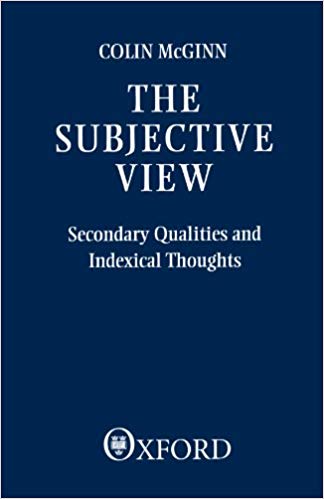
(This book investigates the subjective and objective repre...)
This book investigates the subjective and objective representations of the world, developing analogies between secondary qualities and indexical thoughts and arguing that subjective representations are ineliminable. Throughout, McGinn brings together historical and contemporary discussions to illuminate old problems in a novel way.
https://www.amazon.com/Subjective-View-Secondary-Qualities-Indexical/dp/0198246951/ref=sr_1_1?keywords=The+Subjective+View%3A+Secondary+Qualities+and+Indexical+Thoughts+McGinn&qid=1580978798&s=books&sr=1-1
1983
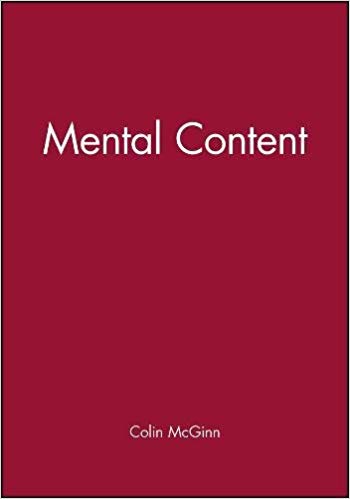
(Aimed at philsophy graduates this book investigates menta...)
Aimed at philsophy graduates this book investigates mental content in a systematic way and advances a number of claims about how mental content states are related to the body and the world. Internalism is the thesis that they are; externalism is the theory that they are not.
https://www.amazon.com/Mental-Content-Colin-McGinn/dp/0631163697/ref=sr_1_1?keywords=Mental+Content+McGinn&qid=1580978945&s=books&sr=1-1
1989
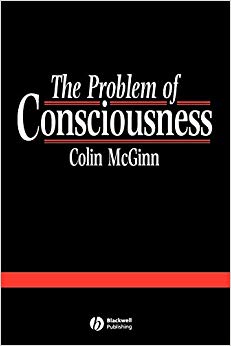
(Can consciousness be fitted into a naturalistic worldview...)
Can consciousness be fitted into a naturalistic worldview or is it inherently mysterious? In virtue of what does a physical organism come to have an inner conscious life? This book argues that we are not equipped to understand the workings of consciousness, despite its objective naturalness. Introspection does not reveal the hidden structure of consciousness and it is this that joins experience to the material world.
https://www.amazon.com/Problem-Consciousness-Essays-Towards-Resolution/dp/0631188037/ref=sr_1_1?keywords=The+Problem+of+Consciousness%3A+Essays+toward+a+Resolution+McGinn&qid=1580979353&s=books&sr=1-1
1991
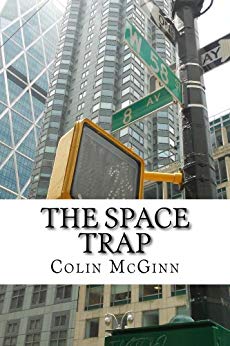
(Alan Swift is an insurance man, a family man, and a space...)
Alan Swift is an insurance man, a family man, and a space man. But he also has two alter egos: a high-flying imaginary self and a low-lying phobic self. These three selves coexist uneasily. Living at home, in Holloway, he succumbs to claustrophobia; traveling abroad he faces agoraphobia. What is he to do? The novel tracks Alan's movements and transformations, as he tries to deal with the conflicting pressures in his psyche. Moving through space, he is dogged by conscience, yet he must also respect his imagination. Should he stay or should he go?
https://www.amazon.com/Space-Trap-Colin-McGinn-ebook/dp/B00GOJ04BQ/ref=sr_1_1?keywords=The+Space+Trap+McGinn&qid=1580979978&s=books&sr=1-1
1992
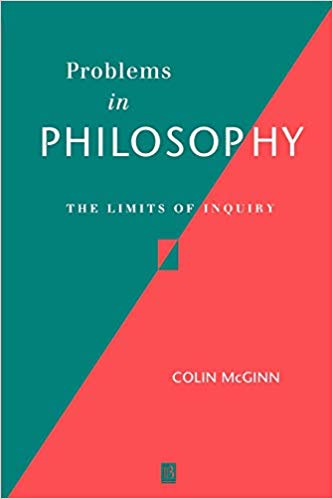
(This advanced introductory text offers a synoptic view of...)
This advanced introductory text offers a synoptic view of philosophical inquiry, discussing such topics as consciousness, the self, meaning, free will, the a priori, and knowledge. The emphasis is on the fundamental intractability of these questions, and theory is proposed as to why the human mind has so much difficulty in resolving them. This theory turns upon a naturalistic picture of the scope and limits of human intelligence.
https://www.amazon.com/Problems-Philosophy-Inquiry-Colin-McGinn/dp/1557864756/ref=sr_1_1?keywords=Problems+in+Philosophy%3A+The+Limits+of+Inquiry+McGinn&qid=1580980041&s=books&sr=1-1
1993
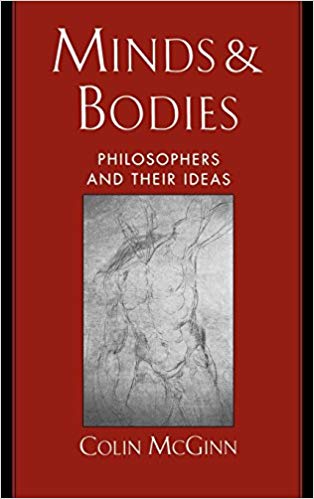
(In Minds and Bodies, Colin McGinn offers proof that conte...)
In Minds and Bodies, Colin McGinn offers proof that contemporary philosophy, in the hands of a consummate reviewer, can be the occasion not only sharp critical assessment, but also writing so clear and engaging that readers with no special background in the subject but simply a taste for challenging idea can feel welcome.
https://www.amazon.com/Minds-Bodies-Philosophers-Their-Philosophy/dp/0195113551/ref=sr_1_1?keywords=Minds+and+Bodies%3A+Philosophers+and+Their+Ideas+McGinn&qid=1580980209&s=books&sr=1-1
1997
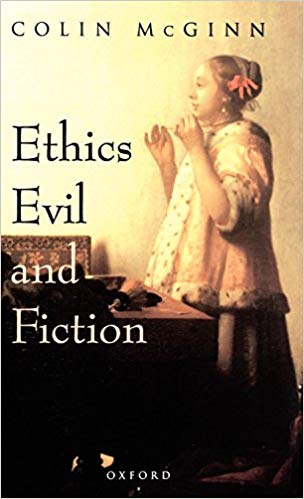
(McGinn's latest brings together moral philosophy and lite...)
McGinn's latest brings together moral philosophy and literary analysis in a way that illuminates both. Setting out to enrich the domain of moral reflection by showing the value of literary texts as sources of moral illumination, McGinn starts by setting out an uncompromisingly realist ethical theory, arguing that morality is an area of objective truth and genuine knowledge. He goes on to address such subjects as the nature of goodness, evil character, and the meaning of monstrosity in the context of an aesthetic theory of virtue, which maintains that goodness of character is the same thing as beauty of soul. Looking at such literary works as Billy Budd, Lolita, The Picture of Dorian Gray, and Frankenstein, as well as examples from film and painting, Ethics, Evil, and Fiction is an original and compelling book by a leading philosopher who is also a critic and novelist.
https://www.amazon.com/Ethics-Evil-Fiction-Colin-McGinn/dp/0198237162/ref=sr_1_1?keywords=ethics%2C+evil%2C+and+fiction+mcginn&qid=1580980533&s=books&sr=1-1
1997
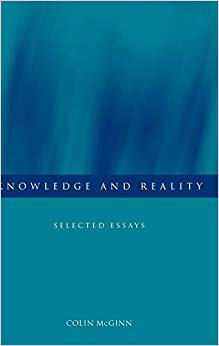
(This book brings together a selection of Colin McGinn's p...)
This book brings together a selection of Colin McGinn's philosophical essays from the 1970s to the 1990s, whose unifying theme is the relation between the mind and the world. The essays range over a set of prominent topics in contemporary philosophy, including the analysis of knowledge, the a priori, necessity, possible worlds, realism, mental representation, appearance and reality, and color.
https://www.amazon.com/Knowledge-Reality-Selected-Colin-McGinn/dp/0198238231/ref=sr_1_1?keywords=Knowledge+and+Reality%3A+Selected+Essay+McGinn&qid=1580980674&s=books&sr=1-1
1999
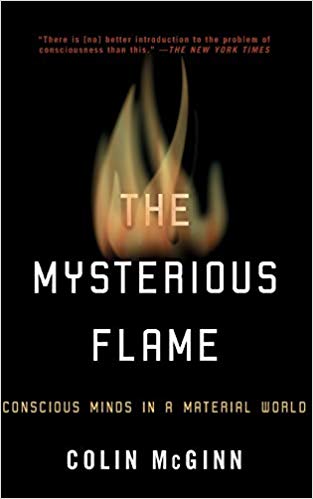
(In recent years the nature of consciousness - our immedia...)
In recent years the nature of consciousness - our immediately known experiences - has taken its place as the most profound problem that science faces. Now in this brilliant and thoroughly accessible new book Colin McGinn takes a provocative position on this perplexing problem. Arguing that we can never truly "know" consciousness - that the human intellect is simply not equipped to unravel this mystery - he demonstrates that accepting this limitation in fact opens up a whole new field of investigation. In elegant prose, McGinn explores the implications of this Mysterian position - such as the new value it gives to the power of dreams and introspection - and challenges the reader with intriguing questions about the very nature of our minds and brains.
https://www.amazon.com/Mysterious-Flame-Conscious-Minds-Material/dp/0465014232/ref=sr_1_1?keywords=The+Mysterious+Flame%3A+Conscious+Minds+in+a+Material+World+McGinn&qid=1580980920&s=books&sr=1-1
1999
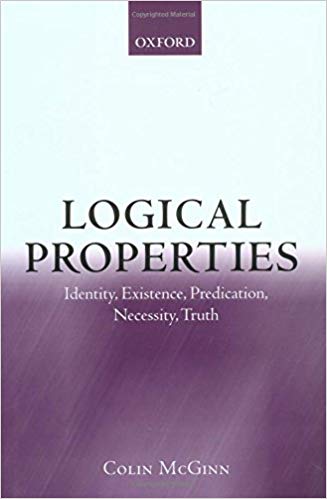
(Identity, existence, predication, necessity, and truth ar...)
Identity, existence, predication, necessity, and truth are vital concepts at the center of philosophy. Yet Colin McGinn believes that orthodox views of these topics are misguided in important ways. Philosophers and logicians have often distorted the nature of these concepts in an attempt to define them according to preconceived ideas.
https://www.amazon.com/Logical-Properties-Existence-Predication-Necessity/dp/0199241813/ref=sr_1_1?keywords=Logical+Properties%3A+Identity%2C+Existence%2C+Predication%2C+Necessity%2C+Truth+McGinn&qid=1580981291&s=books&sr=1-1
2000

(Part memoir, part study, The Making of a Philosopher is t...)
Part memoir, part study, The Making of a Philosopher is the self-portrait of a deeply intelligent mind as it develops over a life lived on both sides of the Atlantic. The Making of a Philosopher follows Colin McGinn from his early years in England, reading Descartes and Anselm, to his years in the States, first in Los Angeles, then New York. McGinn presents a contemporary academic take on the great philosophical figures of the twentieth century, including Bertrand Russell, Jean-Paul Sartre, and Noam Chomsky, alongside stories of the teachers who informed his ideas and often became friends and mentors, especially the colorful A. J. Ayer at Oxford. McGinn's prose is always elegant and probing; students of contemporary philosophy and the general reader alike will absorb every page.
https://www.amazon.com/Making-Philosopher-Journey-Twentieth-Century-Philosophy/dp/0060197927/ref=sr_1_1?keywords=The+Making+of+a+Philosopher%3A+My+Journey+Through+Twentieth-Century+Philosophy&qid=1580981674&s=books&sr=1-1
2002
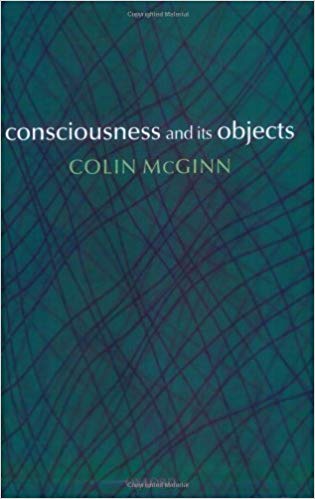
(Colin McGinn presents his latest work on consciousness in...)
Colin McGinn presents his latest work on consciousness in ten interlinked essays, four of them previously unpublished. He extends and deepens his controversial solution to the mind-body problem, defending the view that consciousness is both ontologically unproblematic and epistemologically impenetrable. He discusses the status of first-person authority; argues that all intentionality involves non-existent objects; and suggests that atomism about the conscious mind might be true, and that mind-body dualism is more credible the more extreme it is. On all these topics his views are surprising, in line with his belief that what the philosophy of mind needs now is "methodological radicalism" - a willingness to consider new and seemingly extravagant ideas.
https://www.amazon.com/Consciousness-Its-Objects-Colin-McGinn-ebook/dp/B000TP2NNI/ref=sr_1_1?keywords=Consciousness+and+Its+Objects+McGinn&qid=1580981783&s=books&sr=1-1
2004
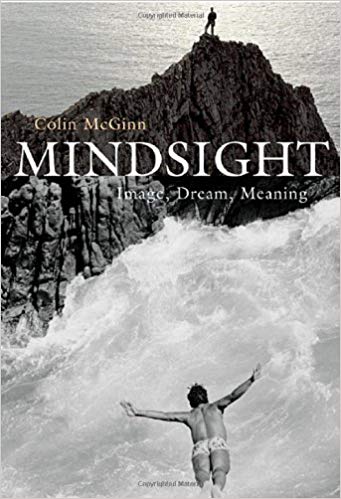
(How to imagine the imagination is a topic that draws phil...)
How to imagine the imagination is a topic that draws philosophers the way flowers draw honeybees. From Plato and Aristotle to Wittgenstein and Sartre, philosophers have talked and written about this most elusive of topics--that is, until contemporary analytic philosophy of mind developed. Perhaps it is the vast range of the topic that has scared off our contemporaries, ranging as it does from mental images to daydreams. The guiding thread of this book is the distinction Colin McGinn draws between perception and imagination. Clearly, seeing an object is similar in certain respects to forming a mental image of it, but it is also different. McGinn shows what the differences are, arguing that imagination is a sui generis mental faculty.
https://www.amazon.com/Mindsight-Image-Meaning-Colin-McGinn/dp/0674015606/ref=sr_1_1?keywords=Mindsight%3A+Image%2C+Dream%2C+Meaning+McGinn&qid=1580981920&s=books&sr=1-1
2004
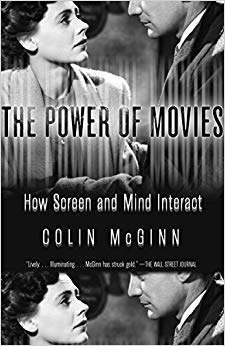
(How is watching a movie similar to dreaming? What goes on...)
How is watching a movie similar to dreaming? What goes on in our minds when we become absorbed in a movie? How does looking "into" a movie screen allow us to experience the thoughts and feelings of a movie’s characters? These and related questions are at the heart of The Power of Movies, a thoughtful, invigorating, and remarkably accessible book about a phenomenon seemingly beyond reach of our understanding.
https://www.amazon.com/Power-Movies-Screen-Mind-Interact/dp/1400077206/ref=sr_1_1?keywords=The+Power+of+Movies%3A+How+Screen+and+Mind+Interact+McGinn&qid=1580982037&s=books&sr=1-1
2005
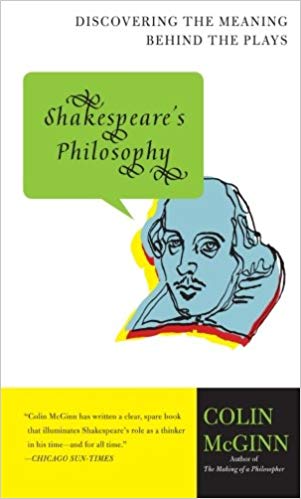
(In his brilliant commentary, McGinn explores Shakespeare'...)
In his brilliant commentary, McGinn explores Shakespeare's philosophy of life and illustrates how he was influenced, for example, by the essays of Montaigne that were translated into English while Shakespeare was writing. In addition to chapters on the great plays, there are also essays on Shakespeare and gender and his plays from the aspects of psychology, ethics, and tragedy.
https://www.amazon.com/Shakespeares-Philosophy-Discovering-Meaning-Behind/dp/0060856165/ref=sr_1_1?keywords=Shakespeare%27s+Philosophy%3A+Discovering+the+Meaning+Behind+the+Plays+McGinn&qid=1580982176&s=books&sr=1-1
2006
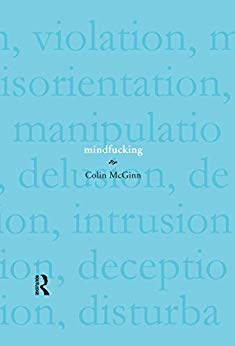
(In "Mindfucking", Colin McGinn investigates and clarifies...)
In "Mindfucking", Colin McGinn investigates and clarifies this phenomenon, taking in the ancient Greeks, Shakespeare and modern techniques of thought control. McGinn assembles the conceptual components of this most complex of concepts - trust, deception, emotion, manipulation, false belief, vulnerability - and explores its very nature. Is philosophy, as a discipline, a type of mindfuck, asks McGinn? Is romantic love a species of mindfuck? The essence is psychological upheaval or disorientation, often abetted by the weaknesses of the victim. Jealousy, insecurity, and prejudice can aid the mindfuck. Delusion is the general result, sometimes insanity. How mindfucked are you? It's hard to say from the inside, but being aware of the phenomenon offers at least some protection.
https://www.amazon.com/Mindfucking-Critique-Manipulation-Colin-McGinn-ebook/dp/B00QRZEBOI/ref=sr_1_1?keywords=Mindfucking%3A+A+Critique+of+Mental+Manipulation+McGinn&qid=1580982305&s=books&sr=1-1
2008
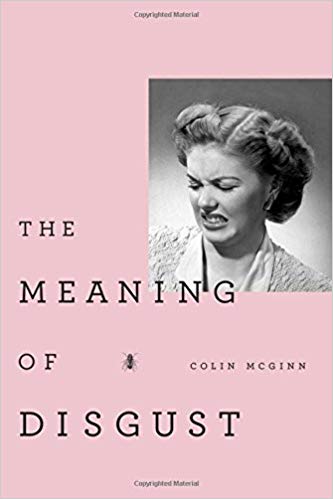
(Disgust has a strong claim to be a distinctively human em...)
Disgust has a strong claim to be a distinctively human emotion. But what is it to be disgusting? What unifies the class of disgusting things? Colin McGinn sets out to analyze the content of disgust, arguing that life and death are implicit in its meaning.
https://www.amazon.com/Meaning-Disgust-Colin-McGinn/dp/0199829535/ref=sr_1_1?keywords=The+Meaning+of+Disgust&qid=1580982448&s=books&sr=1-1
2011
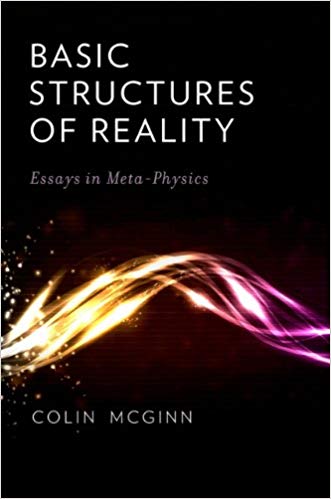
(In Basic Structures of Reality, Colin McGinn deals with q...)
In Basic Structures of Reality, Colin McGinn deals with questions of metaphysics, epistemology, and philosophy of mind from the vantage point of physics. Combining general philosophy with physics, he covers such topics as the definition of matter, the nature of space, motion, gravity, electromagnetic fields, the character of physical knowledge, and consciousness and meaning. Throughout, McGinn maintains an historical perspective and seeks to determine how much we really know of the world described by physics. He defends a version of "structuralism": the thesis that our knowledge is partial and merely abstract, leaving a large epistemological gap at the center of physics.
https://www.amazon.com/Basic-Structures-Reality-Essays-Meta-Physics-ebook/dp/B00JIX53CU/ref=sr_1_1?keywords=Basic+Structures+of+Reality%3A+Essays+in+Meta-Physics&qid=1580982674&s=books&sr=1-1
2011
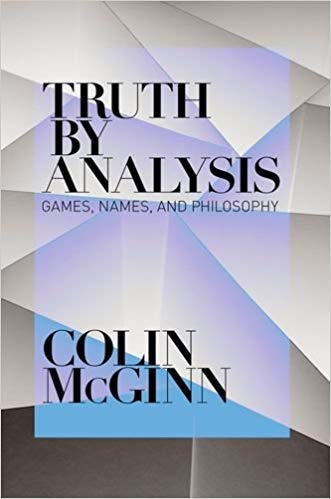
(What kind of subject is philosophy? Colin McGinn takes up...)
What kind of subject is philosophy? Colin McGinn takes up this perennial question, defending the view that philosophy consists of conceptual analysis, construed broadly. Conceptual analysis is understood to involve the search for de re essences, but McGinn takes up various challenges to this meta-philosophy: that some concepts are merely family resemblance concepts with no definition in terms of necessary and sufficient conditions ("game", "language"); that it is impossible to provide sufficient conditions for some philosophically important concepts without circularity ("knowledge", "intentional action"); that there exists an unsolved paradox of analysis; that there is no well-defined analytic-synthetic distinction; that names have no definition; and that conceptual analysis is not properly naturalistic. Ultimately, McGinn finds none of these objections convincing: analysis emerges as both possible and fruitful.
https://www.amazon.com/Truth-Analysis-Games-Names-Philosophy/dp/0199856141/ref=sr_1_1?keywords=Truth+by+Analysis%3A+Games%2C+Names%2C+and+Philosophy&qid=1580982893&s=books&sr=1-1
2011
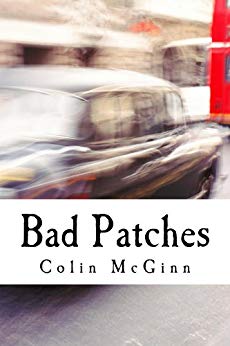
(Dave Green arrives in London with nothing. He is an artis...)
Dave Green arrives in London with nothing. He is an artist, in search of success. Success does not come easy. His sufferings may or may not bring him redemption.
https://www.amazon.com/Bad-Patches-Colin-McGinn-ebook/dp/B008D6F2XI/ref=sr_1_2?keywords=Bad+Patches&qid=1580983312&s=books&sr=1-2
2012
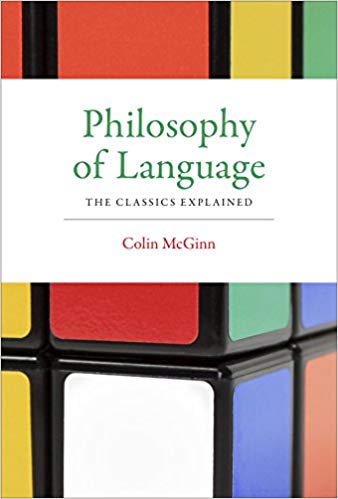
(Many beginning students in philosophy of language find th...)
Many beginning students in philosophy of language find themselves grappling with dense and difficult texts not easily understood by someone new to the field. This book offers an introduction to philosophy of language by explaining ten classics, often anthologized, texts. Accessible and thorough, written with a unique combination of informality and careful formulation, the book addresses sense and reference, proper names, definite descriptions, indexicals, the definition of truth, truth and meaning, and the nature of speaker meaning, as addressed by Frege, Kripke, Russell, Donnellan, Kaplan, Evans, Putnam, Tarski, Davidson, and Grice. The explanations aim to be as simple as possible without sacrificing accuracy; critical assessments are included with the exposition in order to stimulate further thought and discussion.
https://www.amazon.com/Philosophy-Language-Classics-Explained-Press/dp/0262529823/ref=sr_1_3?keywords=Philosophy+of+Language&qid=1580983362&s=books&sr=1-3
2015
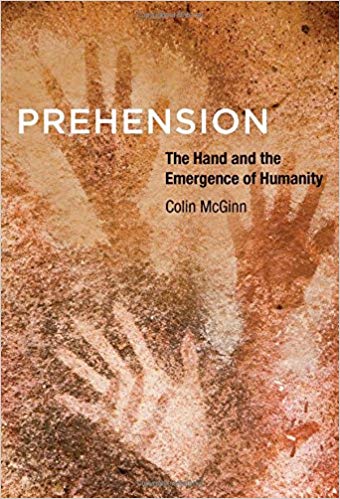
(In Prehension, Colin McGinn links questions from science ...)
In Prehension, Colin McGinn links questions from science to philosophical concerns to consider something that we take for granted: the importance of the hand in everything we do. Drawing on evolutionary biology, anatomy, archaeology, linguistics, psychology, and philosophy, among other disciplines, McGinn examines the role of the hand in shaping human evolution. He finds that the development of our capacity to grasp, to grip, to take hold (also known as prehension) is crucial in the emergence of Homo sapiens.
https://www.amazon.com/Prehension-Hand-Emergence-Humanity-Press/dp/0262029324/ref=sr_1_1?keywords=Prehension%3A+The+Hand+and+the+Emergence+of+Humanity&qid=1580983503&s=books&sr=1-1
2015

(In this book, Colin McGinn presents a concise, clear, and...)
In this book, Colin McGinn presents a concise, clear, and compelling argument that the origins of knowledge are innate - that nativism, not empiricism, is correct in its theory of how concepts are acquired. McGinn considers the particular case of sensible qualities - ideas of color, shape, taste, and so on. He argues that these, which he once regarded as the strongest case for the empiricist position, are in fact not well explained by the empiricist account that they derive from interactions with external objects. Rather, he contends, ideas of sensible qualities offer the strongest case for the nativist position - that a large range of our knowledge is inborn, not acquired through the senses. Yet, McGinn cautions, how this can be is deeply problematic; we have no good theories about how innate knowledge is possible. Innate knowledge is a mystery, though a fact.
https://www.amazon.com/Inborn-Knowledge-Mystery-Within-Press/dp/0262029391/ref=sr_1_1?keywords=Inborn+Knowledge%3A+The+Mystery+Within&qid=1580983660&s=books&sr=1-1
2015
Colin McGinn was born on March 10, 1950, in West Hartlepool, County Durham, England, United Kingdom. He is a son of Joseph McGinn. He has two brothers.
In 1971 Colin McGinn received a Bachelor of Arts degree from the University of Manchester and a Master of Arts degree in 1972. In 1974 McGinn obtained a Bachelor of Philosophy from Jesus College, Oxford.
From 1975 to 1985 Colin McGinn was a professor at University College London. From 1985 to 1990 he worked as the Wilde Reader in Mental Philosophy at the University of Oxford. From 1990 to 2005 she was a professor of philosophy at Rutgers University. In 2006 he was appointed a professor of philosophy at the University of Miami and served until 2013.
He held visiting professorships at the University of California, Los Angeles, University of Bielefeld, University of Southern California, Rutgers University, University of Helsinki, City University of New York and Princeton University.
Outside his work in philosophy, McGinn has published The Character of Mind (1982), The Subjective View: Secondary Qualities and Indexical Thoughts (1983), Wittgenstein on Meaning (1984), Mental Content (1989), The Problem of Consciousness (1991), and others.
(How is watching a movie similar to dreaming? What goes on...)
2005(In Minds and Bodies, Colin McGinn offers proof that conte...)
1997(Can consciousness be fitted into a naturalistic worldview...)
1991(In his brilliant commentary, McGinn explores Shakespeare'...)
2006(This book investigates the subjective and objective repre...)
1983(In this book, Colin McGinn presents a concise, clear, and...)
2015(Aimed at philsophy graduates this book investigates menta...)
1989(This advanced introductory text offers a synoptic view of...)
1993(In Prehension, Colin McGinn links questions from science ...)
2015(This book brings together a selection of Colin McGinn's p...)
1999(What kind of subject is philosophy? Colin McGinn takes up...)
2011(Part memoir, part study, The Making of a Philosopher is t...)
2002(In "Mindfucking", Colin McGinn investigates and clarifies...)
2008(Many beginning students in philosophy of language find th...)
2015(In Basic Structures of Reality, Colin McGinn deals with q...)
2011(In recent years the nature of consciousness - our immedia...)
1999(Colin McGinn presents his latest work on consciousness in...)
2004(McGinn's latest brings together moral philosophy and lite...)
1997(Identity, existence, predication, necessity, and truth ar...)
2000(How to imagine the imagination is a topic that draws phil...)
2004(Disgust has a strong claim to be a distinctively human em...)
2011(Alan Swift is an insurance man, a family man, and a space...)
1992(Dave Green arrives in London with nothing. He is an artis...)
2012
